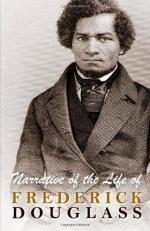To describe the wealth of Colonel Lloyd would be almost equal to describing the riches of Job. He kept from ten to fifteen house-servants. He was said to own a thousand slaves, and I think this estimate quite within the truth. Colonel Lloyd owned so many that he did not know them when he saw them; nor did all the slaves of the out-farms know him. It is reported of him, that, while riding along the road one day, he met a colored man, and addressed him in the usual manner of speaking to colored people on the public highways of the south: “Well, boy, whom do you belong to?” “To Colonel Lloyd,” replied the slave. “Well, does the colonel treat you well?” “No, sir,” was the ready reply. “What, does he work you too hard?” “Yes, sir.” “Well, don’t he give you enough to eat?” “Yes, sir, he gives me enough, such as it is.”
The colonel, after ascertaining where the slave belonged, rode on; the man also went on about his business, not dreaming that he had been conversing with his master. He thought, said, and heard nothing more of the matter, until two or three weeks afterwards. The poor man was then informed by his overseer that, for having found fault with his master, he was now to be sold to a Georgia trader. He was immediately chained and handcuffed; and thus, without a moment’s warning, he was snatched away, and forever sundered, from his family and friends, by a hand more unrelenting than death. This is the penalty of telling the truth, of telling the simple truth, in answer to a series of plain questions.
It is partly in consequence of such facts, that slaves, when inquired of as to their condition and the character of their masters, almost universally say they are contented, and that their masters are kind. The slaveholders have been known to send in spies among their slaves, to ascertain their views and feelings in regard to their condition. The frequency of this has had the effect to establish among the slaves the maxim, that a still tongue makes a wise head. They suppress the truth rather than take the consequences of telling it, and in so doing prove themselves a part of the human family. If they have any thing to say of their masters, it is generally in their masters’ favor, especially when speaking to an untried man. I have been frequently asked, when a slave, if I had a kind master, and do not remember




